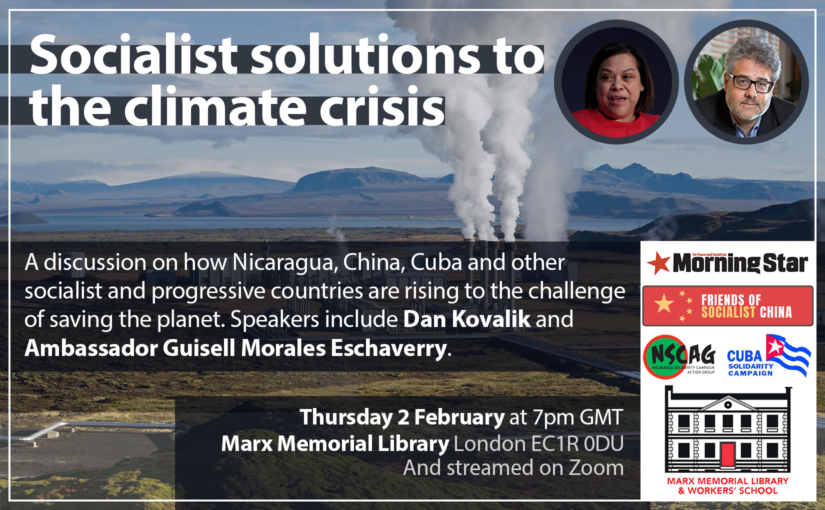On Thursday 2 February 2023, Friends of Socialist China organised – along with the Marx Memorial Library, Morning Star, Nicaragua Solidarity Campaign Action Group and Cuba Solidarity Campaign – a hybrid in-person/online event at Marx Memorial Library on socialist solutions to the climate crisis, with a particular focus on the strategies being pursued in China, Nicaragua and Cuba in relation to preventing climate breakdown, the collapse of biodiversity, and other key ecological challenges.
Guisell Morales Echaverry, Ambassador of the Republic of Nicaragua to the United Kingdom, Ireland and Iceland, noted that the major capitalist countries – historically the biggest polluters – have utterly failed to meaningfully address the environmental crisis. Instead, it’s the socialist and progressive governments that are taking resolute action and that have been powerful voices for climate justice. Guisell described Nicaragua’s remarkable progress on ecological issues, including sourcing 70 percent of its energy from renewable sources; its successes in pursuing food sovereignty; and its commitment to agroecology and agroforestry. She concluded by stating that the capitalist system is killing the planet with its market anarchy and relentless pursuit of profit. It’s driving us to extinction. Socialism is the future and the key to human survival.
Ben Chacko, editor of the Morning Star, observed that Britain, the US and the other Western powers are failing to meet their ecological commitments. They claim to understand there’s a problem that needs solving, but they’ve left the green transition in the hands of companies that profit the most from fossil fuels. What we end up with is greenwashing, such as rebranding BP as ‘Beyond Petroleum’. Ben made a connection between the questions of climate breakdown and war, pointing to the extraordinary environmental damage caused by the military-industrial complex, most of all the US military. Meanwhile the sanctions regime against Russia is causing significant reverses, with Germany for example reopening coal mines. Ben contrasted this with the action being taken in the socialist world – “there’s a clear attitude in Beijing, Havana and Managua that we have to urgently face up to this crisis.”
Dan Kovalik, US-based activist and lawyer, and author of the new book Nicaragua: A History of Us Intervention & Resistance, said that climate change is a problem created by rich people and rich countries, but it’s a problem that’s having its most devastating effect on poor people and poor countries; he cited the startling fact that the Dallas Cowboys stadium uses more electricity on a game night than Liberia does in an entire day. Dan talked in detail about the relationship between war and the environment – for example the disastrous environmental degradation suffered by Iraq – and noted that China, Cuba and Nicaragua are all countries that prioritise humanity and the planet rather than engaging in military aggression. He pointed to the importance of Lula’s victory in the Brazilian elections, observing that, when asked if Brazil would send weapons to Ukraine, Lula said that our war is with poverty, not Russia. Dan described the important work being done in Nicaragua on alternative fuels, rainforest protection, protection of indigenous lands, and integration into a rising multipolar system of international relations.
Lauren Collins, an honorary research fellow at the University of Nottingham and member of the Cuba Solidarity Campaign executive committee, talked about Cuba’s approach to climate change mitigation and adaptation and highlighted Cuba’s vulnerability to the environmental crisis: while Cuba is responsible for just 0.06 percent of global emissions, it’s experiencing a significant increase in severe weather events, hurricanes, rising sea levels, degradation of arable land, drought and higher temperatures, all of which are having a serious impact on health and agriculture. Lauren described Tarea Vida, Cuba’s wide-ranging state program to confront climate change, which places a strong emphasis on community self-organisation and the participation of trade unions, Committees for the Defence of the Revolution, the Federation of Cuban Women and other mass organisations in adapting to the changing ecosystem. Lauren also spoke of the devastating impact of the US’s illegal blockade, one of the effects of which is to shut Cuba out of various funding sources for climate change adaptation.
Paul Atkin, a retired teacher, National Education Union activist and climate campaigner, focused on China’s impressive efforts towards preventing climate breakdown and protecting biodiversity. For example, while China is still quite dependent on coal, the proportion of coal in China’s energy mix has dropped from over 80 percent to more like 50 percent in the space of just over a decade. China accounts for half the world’s off-shore wind investment and approximately 99 percent of the world’s electric buses. China’s unprecedented investment in high-speed rail has resulted in a decrease in domestic air traffic – in contrast with the US, where there is almost no high-speed rail and domestic air traffic is increasing. While the US spends 14 times as much on its military than on green transition, China spends more than double on its green transition than on its military. Unfortunately, Paul observed, the anti-China propaganda in the West is so powerful that very few are paying attention to its progress on these issues, even within the left and the climate movement. Paul called on the audience to tell the truth about China and expose lies; to oppose the war drive; and to oppose the notion of decoupling, noting that the US’s sanctions on solar panels from China have led to a 23 percent reduction in solar installations in the US.
A lively and useful Q&A session followed the presentations. The stream of the event is embedded below.


One thought on “Event in London explores socialist solutions to the climate crisis”